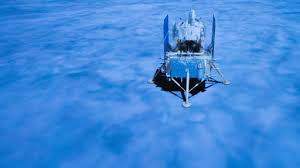China Lands a Probe on the Moon as It Pursues Space Ambitions

China on Tuesday said it landed a probe on the moon in its latest space endeavor and humanity’s first bid since the 1970s to return lunar samples to Earth.
The successful touchdown came a little more than a week after the unmanned Chang’e 5 probe lifted off from southern China on Nov. 24, state media said late China time Tuesday, quoting China’s National Space Administration. A round of applause broke out in the Beijing control room where the landing was monitored after an announcement the probe had “landed on the surface of the moon,” according to a broadcast on China Central Television.
Only the U.S. and the former Soviet Union have managed to return lunar samples, and not in almost 45 years. The plan is to retrieve around 4.4 pounds of rock samples and materials from just below the lunar surface. The moon is central to China’s fast-advancing scientific and strategic space ambitions.
The lander is expected to operate and depart from the moon within one lunar daytime, giving it about two weeks of Earth days. After collecting samples, it is scheduled to blast off the moon and connect with a lunar orbiter before returning to Earth midmonth.
China launched its first manned space flight in 2003 and in space has explored quantum communications, erected a large radio telescope and built a system of satellites to support a GPS-like navigation system.
China deliberately crashed a spacecraft into the moon in 2009 after mapping it from orbit and has now returned there with three successful unmanned landings, including one in early 2019, when it put a probe on the dark side of the moon, in a first for humanity. China hasn’t tried to put a person on the moon.
A Chinese Mars lander is due at the red planet around February.
China hopes to establish a manned base on the moon during the current decade, from which it could further explore deep space. The moon’s supply of helium-3, a potential energy source, has been of particular interest to Beijing. The potential for water on the moon is important as a possible rocket fuel if it is found and can be broken into hydrogen and oxygen.
Any permanent Chinese presence on the moon promises to rewrite the global order in space, and scientists say Beijing is eager to build capacity there in terms of rules of exploration and access to resources.
Partly with an eye on China’s efforts, President Trump last year announced creation of the Space Command to coordinate activity and a Space Force military branch under the Air Force.
Photo: China’s Chang’e 5 probe touched down on the moon to collect and bring back samples to Earth. WSJ’s Trefor Moss reports on why this lunar mission could be a milestone for the country’s young but ambitious space program. Credit: Jin Liwang/Zuma Press
Link: https://www.wsj.com/articles/china-lands-a-probe-on-the-moon-as-it-pursues-space-ambitions-11606842163











